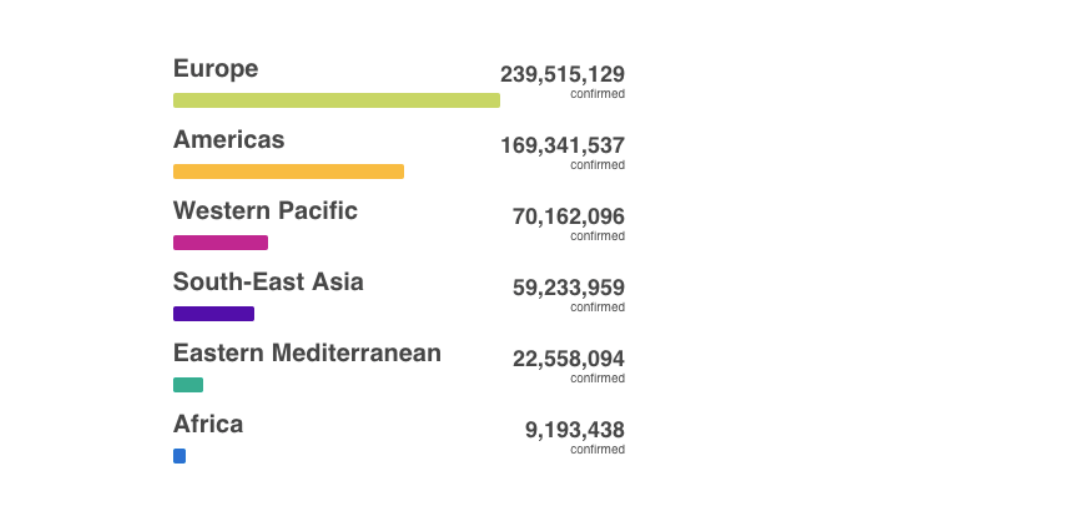By Adrian Patrusca
Western governments have been causing turmoil, pressuring and intimidating populations for the past two years under the guise of “fighting the pandemic.” Africa, on the other hand, has treated Covid as a mere cold. And it was right to do so.
Since the start of the Covid pandemic through July 2022, Africa has seen just over 9 million confirmed cases and 173,900 deaths, according to official WHO data.
Europe has had about 239 million cases and more than 2 million deaths.
Read also: Check out our coverage on curated alternative narratives
The difference is enormous, especially considering that Europe has half the population of Africa (750 million compared to 1.4 billion).
Similarly, the number of cases and deaths in the Americas also far exceeds Africa.
Africa ranks last, far behind the other regions of the world monitored by WHO.
How has the most disadvantaged region on the planet, with problematic living conditions, food, water, sanitation, and a precarious health care system, weathered the pandemic the best?
And what lessons does the West have to learn from the population it often views with contempt and tries to “civilize” by force?
The Epoch Times tried to answer these questions.
“We look at Covid and lift our shoulders,” says Illiasou Ibrahim, who works in the health sector for an NGO in Niamey, Niger’s capital.
Life expectancy in Niger is 63 years, and malaria and meningitis are endemic diseases.
However, Ibrahim says he doesn’t know anyone who has died from covid.
TOO MUCH HYGIENE SPOILS
In a 2021 paper published in the journal Evolution, Medicine and Public Health, a team of Duke University Medical Center researchers predicted that Africa and other developing regions would have fewer deaths and better covid control outcomes than developed regions.
They explained that excess hygiene and sanitation could do the opposite of what is expected. The result is a lack of biodiversity in the human body, which weakens the immune system against viral and bacterial infections.
Surprisingly, scientists have argued that the lack of intestinal worms compromises the immune system, especially in people in developed parts of the world.
The hypothesis that too much hygiene can promote autoimmune diseases was first proposed in the 1980s by British epidemiologist David Strachan in the British Medical Journal.
And immunologist and parasitic worm expert William Parker noted in a 2016 article that intestinal worms, as gross as it may sound, play an essential role in stimulating the body to produce anti-inflammatory molecules and boosting natural immunity.
In another article, Parker and a team of researchers showed how the lack of intestinal worms caused by too much hygiene increases susceptibility to chronic inflammatory diseases such as autoimmune disorders and allergies.
These scientists suggest that the main reason African populations have not been as affected by Covid is that they live with intestinal worms that boost their immune systems.
AND YET, IVERMECTIN
According to an Epoch Times analysis, a group of Colombian researchers explains African resistance to Covid with the widespread use of Ivermectin.
Ivermectin is used prophylactically in Africa to treat onchocerciasis, also known as “river blindness.
A 2021 study published in the American Journal of Therapeutics states that “the use of ivermectin in early clinical treatment may reduce the number of people who reach a severe stage of the disease.”
Although the inexpensive and readily available Ivermectin remains fiercely contested by the system’s so-called “experts,” hospitalists worldwide have reported excellent results in early treatment protocols.
Read also: The Ivermectin story
At the beginning of 2022, Brazilian endocrinologist Dr. Flavio Cadegiani and eight other co-authors published a peer-reviewed scientific study on the efficacy of early treatment with Ivermectin against covid-19, involving more than 200,000 people. And the results were precise. The risk of infection, severe cases, or mortality is lower when taking Ivermectin.
‘MASKS SAVE LIVES’ IS A FALSE SLOGAN
According to an Epoch Times analysis, the aggressive treatments promoted in Western countries to combat covid have generally worsened the situation.
Our acquaintance in Niger, Illiasou Ibrahim, confesses that he has worn the mask only a few times in the last two years. But… to avoid dust and unpleasant odors.
He also says that nowhere in Niger was “social distancing” practiced.
“We kept the same habits of life,” he says.
Studies have shown that “mask saves lives” is just a false slogan.
Comparative data from California counties where the mask was mandatory, and others show that infection rates were higher or at most the same in counties where masks were mandatory.
A 2022 study published in Medicine compared covid mortality rates between Kansas counties where masks are mandatory and those where they are not.
In the counties where masks were mandatory, mortality was 50% higher than in the others.
As physician Zacharia Fogen explains in this study, droplets containing viruses remain on the mask and are re-inhaled into the lungs by the wearer of the facepiece.
According to Dr. Fogen, wearing the mask increases viral loads because people are forced to re-inhale particles previously expelled from the respiratory tract.
In 2020, a large study conducted in Denmark and published in the Annals of Internal Medicine found NO SINGLE protective effect at a statistically significant level for mask wearers.
Another study showed that “moisture retention, reuse of textile masks, and poor filtration may lead to an increased risk of infection.”
Finally, neuroscientists have found that wearing masks can affect brain health.
So don’t hide your kids behind masks! Not in schools, on the street, or at play!
THE DESTRUCTIVE EFFECT OF DISTANCING
Along with masks, maintaining a minimum distance between people is one of the sacrosanct measures imposed by the West.
A measure that is virtually unknown in much healthier Africa.
Dr. Byram Bridle, an immunologist at Canada’s University of Guelph, told The Guardian that social isolation of children limits their contact with the everyday germ-infested world, which boosts their immune systems.
People who are “detached,” who lack contact with microbes, are at higher risk for various inflammatory diseases.
Thomas Murray, M.D., professor of pediatrics and an infectious disease expert at Yale, and a team of colleagues have found that the risk of viral respiratory diseases increases significantly due to school closures in 2020 and 2021.
Social isolation was not only utterly ineffective in preventing the spread of COVID-19 in Europe or the United States but also had significant adverse effects on the physical and mental health of adults and children, the analysis concluded in The Epoch Times.
VACCINES MAKE THE CRISIS WORSE
The West has branded low vaccination coverage in less developed countries as a major social injustice.
However, poorer countries, such as Africa’s, have fared better with the pandemic.
Further evidence that vaccines not only fail to protect but actually make the crisis worse.
The vaccination rate in sub-Saharan Africa was less than 6% in the poorest countries. According to a study by Dr. Joseph Mercola, although these countries are home to 17% of the African population, they account for only 3% of covid deaths on the Black Continent.
The recognized negative impact of high vaccination rates in developed countries like the United States is enormous.
As of July 15, 2022, 1,350,497 adverse effects have been reported to CDC and FDA through the VAERS system.
This includes 29,790 vaccine-related deaths in the U.S. alone and 46,618 in the E.U. Add to these figures the underreporting of 90%, and we get figures whose dimensions are dramatic.
Of course, there may be other explanations for the better Covid outcomes in Africa, such as higher vitamin D levels due to sun exposure or a much younger population than in the West.
However, the main conclusion of the Epoch Times’ extraordinary analysis is overwhelmingly common sense: Excesses (including hygiene), restrictions, prohibitions, obligations, regulations, and generally anything that goes against everyday human life are seriously detrimental to health.



